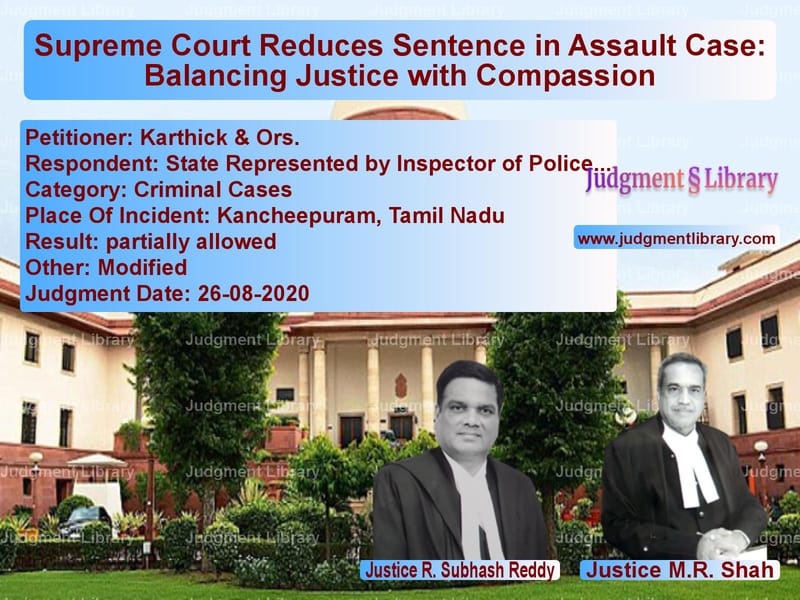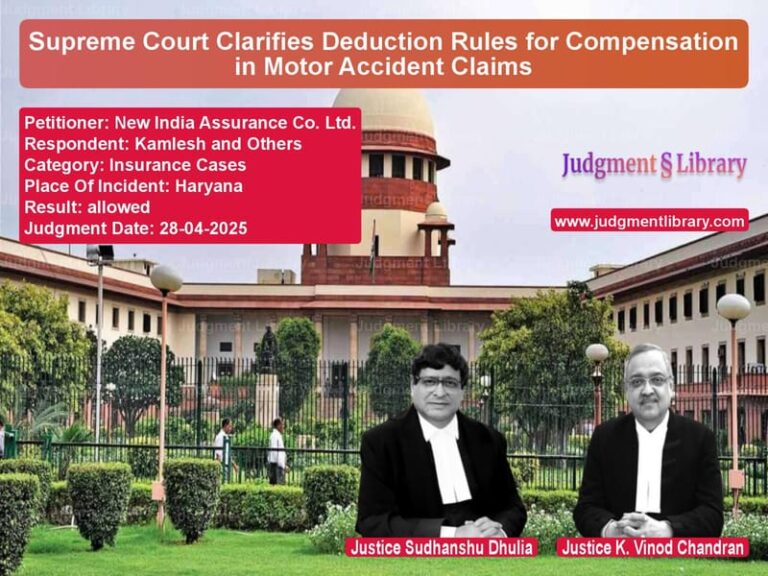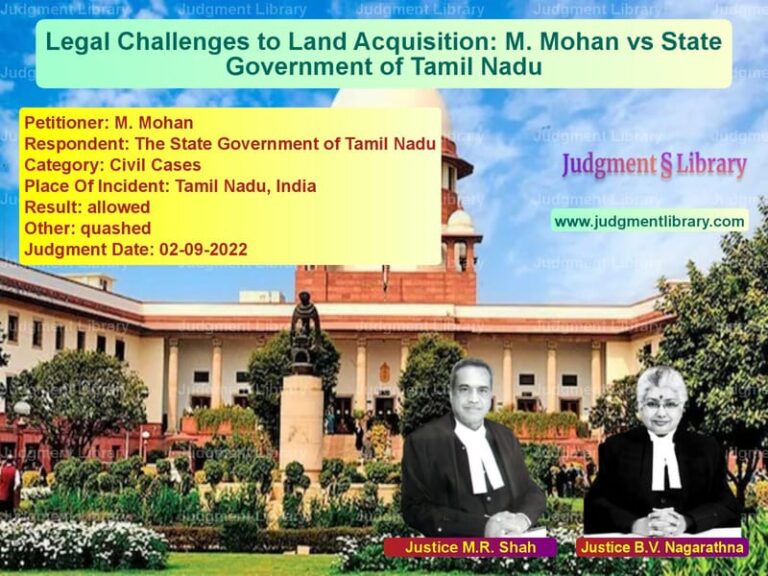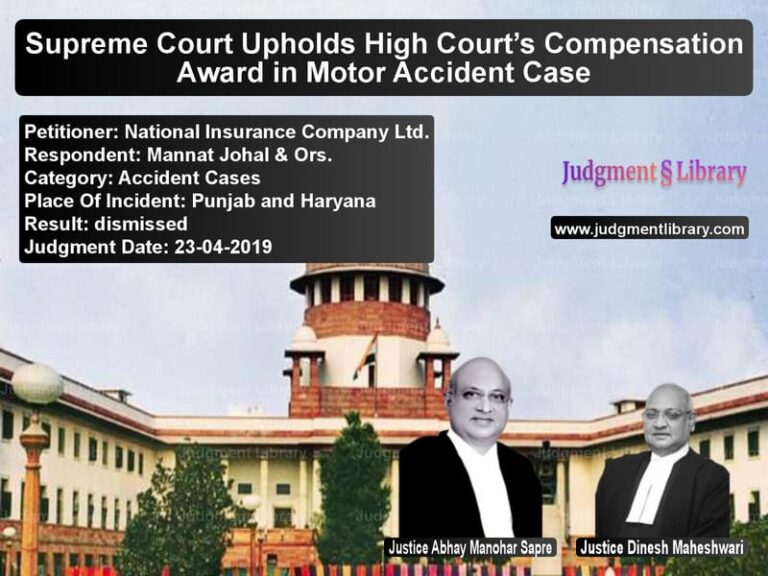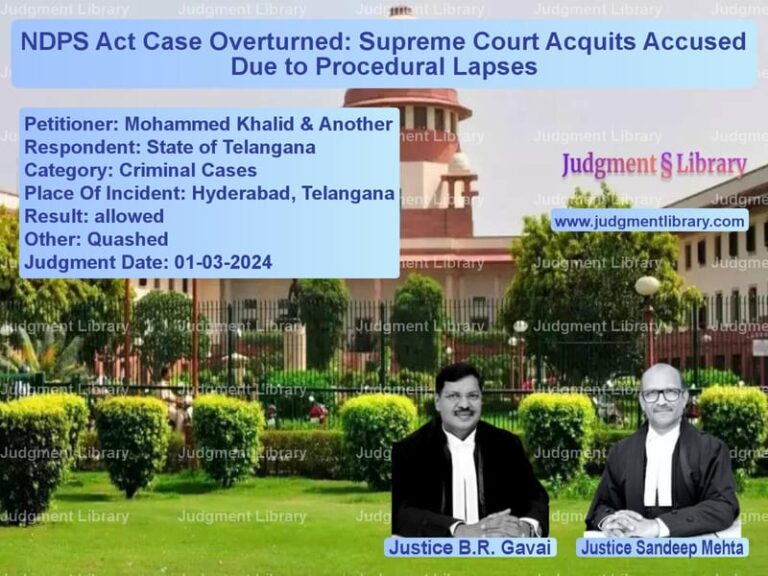Supreme Court Reduces Sentence in Assault Case: Balancing Justice with Compassion
The Supreme Court in Karthick & Ors. vs. State Represented by Inspector of Police, Kancheepuram District, Tamil Nadu delivered a significant ruling concerning criminal sentencing, judicial discretion, and compensation for victims. The case revolved around a minor altercation that resulted in injuries, leading to convictions under the Indian Penal Code (IPC). While upholding the conviction, the Supreme Court modified the sentence, emphasizing the principles of fair sentencing and victim compensation.
Background of the Case
The case stemmed from a dispute over the plucking of jamun (blackberries) in a Tamil Nadu village. An argument escalated into a physical altercation, during which the complainant and a few others sustained injuries, including a fractured finger. The accused were charged under Sections 147, 323, and 325 of the IPC.
The trial court convicted the appellants and sentenced them to one year of simple imprisonment. The High Court upheld this verdict, leading to an appeal before the Supreme Court. While the Court did not find merit in overturning the conviction, it entertained the appeal concerning the quantum of sentence.
Legal Issues Raised
- Whether the sentence awarded was proportionate to the offense.
- Whether mitigating factors such as the young age of the accused and the nature of the injuries warranted a reduced sentence.
- Whether compensation to the victim should be increased instead of imposing a prolonged custodial sentence.
Arguments by the Appellants
- The accused had already undergone six months of their sentence, demonstrating sufficient punishment.
- The incident was not premeditated but arose out of a sudden and trivial dispute.
- The appellants were young (between 21 and 23 years old) at the time of the offense and had no prior criminal records.
- Given the minor nature of the injuries, prolonged imprisonment would be disproportionate and unjust.
Arguments by the State (Respondent)
- The conviction was based on clear evidence, and the sentence was legally justified.
- The complainant suffered multiple injuries, including a fractured finger, which warranted serious legal consequences.
- Given the nature of the offense, reducing the sentence might send the wrong message about leniency in criminal acts.
Supreme Court’s Observations
The Supreme Court carefully examined the case, considering past precedents on sentencing and proportionality. The key observations were:
- The accused had already served a substantial portion of their sentence.
- Although injuries were inflicted, they were not life-threatening, and the attack was not pre-planned.
- The age of the accused played a significant role in determining the appropriate punishment.
- Compensation to the victim should be increased as a measure of justice instead of prolonging imprisonment.
Final Judgment
The Supreme Court modified the sentence as follows:
- The conviction under Sections 147, 323, and 325 IPC was upheld.
- The sentence was reduced to the period already undergone (approximately six months).
- The compensation payable to the injured party (P.W.3) was increased by Rs. 25,000, to be paid within six weeks.
Judicial Reasoning Behind Sentence Reduction
The Court noted that sentencing is not just about retribution but also about rehabilitation and fairness. The judgment reflected several key principles:
- Reformation over Retribution: The Court emphasized the need to provide young offenders a chance to reform rather than subjecting them to prolonged incarceration.
- Proportionality in Sentencing: The punishment must fit the crime, and in cases where injuries are not grievous, a long sentence is not always warranted.
- Compensation as a Remedy: Increasing compensation to the victim ensures justice while allowing the offender an opportunity to rehabilitate.
Implications of the Judgment
- Setting a Precedent for Sentencing: The ruling clarifies that courts must balance punitive measures with restorative justice principles.
- Victim Compensation: The judgment reinforces the trend of enhancing financial compensation to victims in cases where sentences are reduced.
- Judicial Discretion: The case demonstrates the Supreme Court’s approach to ensuring justice through individualized sentencing rather than adopting a one-size-fits-all policy.
In conclusion, the ruling in Karthick & Ors. vs. State of Tamil Nadu underscores the principle that criminal law must be just and humane, balancing the rights of the accused and the victims alike.
Petitioner Name: Karthick & Ors..Respondent Name: State Represented by Inspector of Police, Kancheepuram District, Tamil Nadu.Judgment By: Justice R. Subhash Reddy, Justice M.R. Shah.Place Of Incident: Kancheepuram, Tamil Nadu.Judgment Date: 26-08-2020.
Don’t miss out on the full details! Download the complete judgment in PDF format below and gain valuable insights instantly!
Download Judgment: Karthick & Ors. vs State Represented by Supreme Court of India Judgment Dated 26-08-2020.pdf
Direct Downlaod Judgment: Direct downlaod this Judgment
See all petitions in Bail and Anticipatory Bail
See all petitions in Custodial Deaths and Police Misconduct
See all petitions in Judgment by R. Subhash Reddy
See all petitions in Judgment by Mukeshkumar Rasikbhai Shah
See all petitions in partially allowed
See all petitions in Modified
See all petitions in supreme court of India judgments August 2020
See all petitions in 2020 judgments
See all posts in Criminal Cases Category
See all allowed petitions in Criminal Cases Category
See all Dismissed petitions in Criminal Cases Category
See all partially allowed petitions in Criminal Cases Category

